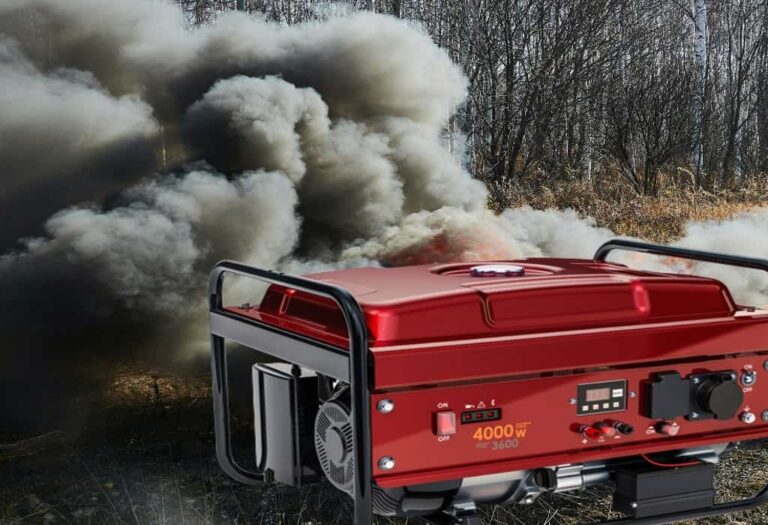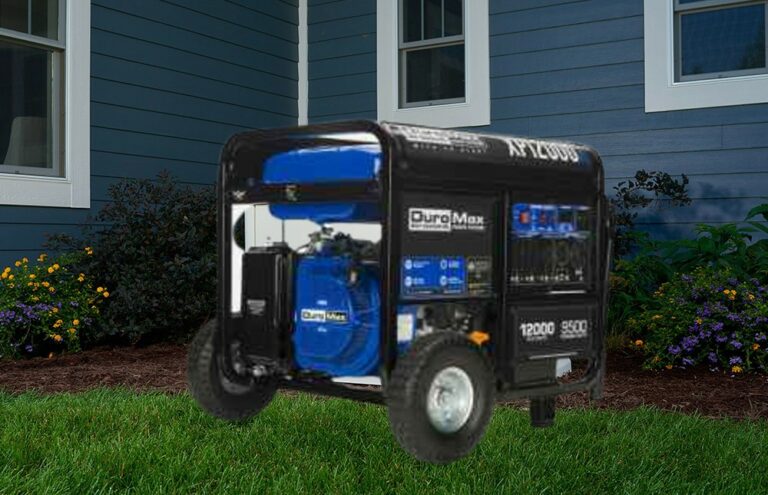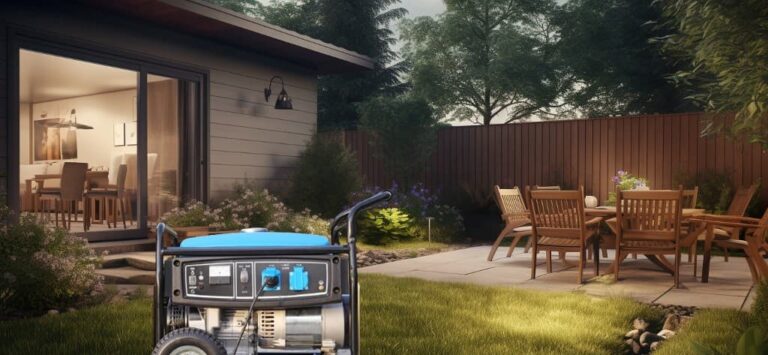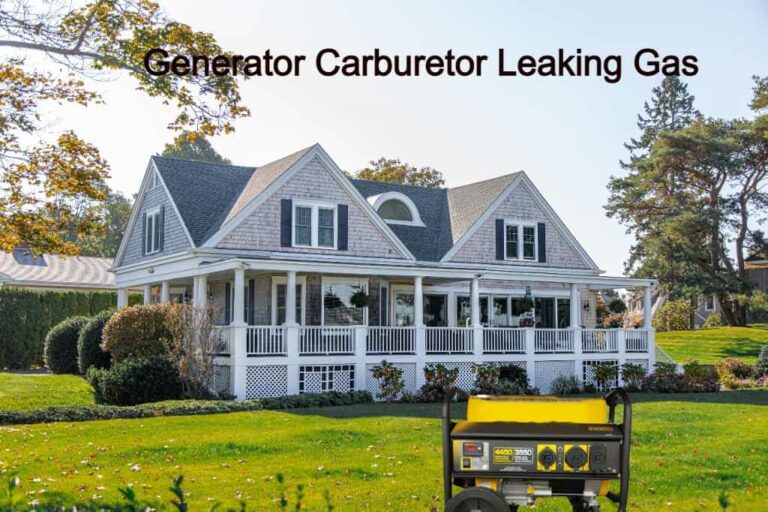Generator Safety Tips: Protecting Your Home And Your Investment
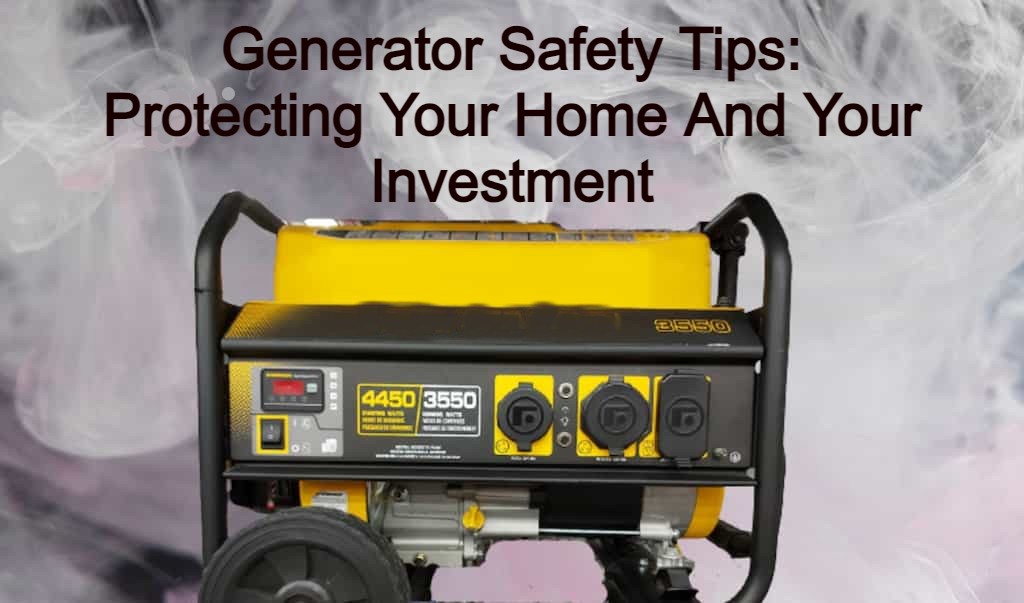
Are you ready to fire up and secure your home and investment? Like an angelic protector, a generator stands tall, eager to keep your home safe and secure when the lights unexpectedly go out. But for it to be effective, it is paramount to follow these essential safety strategies.
In this piece, you’ll discover the secrets to shielding your generator and your beloved belongings. From picking the perfect generator for your requirements to comprehending electrical load and volume, we’ll take you through every step. We’ll show you how to properly install and place your generator, store and manipulate fuel, and carry out regular maintenance and reviews.
We’ll also educate you on how to use extension cords cautiously and protect your generator from the weather. With emergency shut-off systems and teaching your family about generator safety, you’ll feel sure knowing you’re taking the necessary precautions.
So, let’s plunge in and construct a barrier of protection around your home and investment!
Choosing the Right Generator for Your Needs
When selecting the appropriate generator for your demand, it’s imperative to examine not only the power yield but also the fuel proficiency and sound level to guarantee a smooth and cost-effective solution.
Begin by evaluating your power needs. Ascertain how many machines and gadgets you have to run amid an interruption. This will help you decide the wattage limit you need in a generator.
Additionally, contemplate the fuel effectiveness of the generator. Search for models that offer more extended running times on a solitary fuel tank, as this will spare you cash in the long haul.
Sound level is another significant factor to contemplate. Generators can be very boisterous, so if commotion is an issue for you and your neighbors, search for models that are explicitly intended to work unobtrusively.
Numerous generators presently accompany noise-lessening highlights, for example, soundproof housings or silencers.
Subsequent to picking the correct generator for your needs, it’s an ideal opportunity to consider legitimate establishment and arrangement. This incorporates discovering a reasonable area for your generator, guaranteeing it’s introduced accurately, and following all wellbeing rules.
Appropriate establishment and arrangement won’t just guarantee ideal execution yet additionally forestall any potential risks or mishaps.
Transitioning into the following area, we will investigate the significance of proper installation and arrangement for generator safety.
Proper Installation and Placement
To guarantee a flawless setup and optimal positioning, it’s imperative to install and place your power backup system accurately.
Select an area that has plenty of ventilation and is sheltered from the weather. Keep the generator away from windows or air ducts to avoid carbon monoxide accumulation. Make sure the region is clear of combustible materials and at least five feet away from any flammable surfaces.
Give a stable base for the generator by situating it on a concrete pad or level ground. This will impede vibrations and reduce sound.
Subsequently, attach the generator to a transfer switch, which securely disperses power to your home’s electric system. This stops back feeding, where power flows back into the utility lines and poses a threat to utility workers.
At last, guarantee to observe all local codes and regulations during installation.
Comprehending electrical load and capacity is the next significant step in guaranteeing a secure and efficient power backup system.
Understanding Electrical Load and Capacity
Gaining an insight into electrical load and capacity is fundamental to securing a reliable and efficient power backup system that fulfills the electrical needs of your residence. When utilizing a generator, it’s imperative to grasp the electrical load it can handle and the capacity it can deliver.
The electrical load alludes to the amount of power demanded by your appliances and devices, while the capacity indicates the maximum power output of the generator. To identify the electrical load of your home, you must compute the wattage of each device and appliance that will be linked to the generator. This information is usually located on the appliance label or in the user manual. Once you have the wattage for each item, total them up to get the overall electrical load.
Subsequently, you should make sure that your generator has the capacity to manage the total electrical load of your home. Generators are frequently rated based on their maximum power output, measured in watts. It’s essential to select a generator with a capacity that is equal to or greater than the total electrical load of your home.
Having an understanding of electrical load and capacity will assist you in selecting the proper generator for your home and preventing overloading the system. With this knowledge, you can guarantee that your power backup system runs correctly and supplies the necessary electricity during an outage.
Now let’s move on to the following section, which covers fuel storage and handling, an essential element of generator safety.
Fuel Storage and Handling
Ensure you correctly store and handle combustible substances to maintain a dependable power backup system.
Regarding fuel storage, keeping the fluid in a well-ventilated area away from any potential ignition sources is essential. Keep the fuel in sanctioned containers that are designed mainly for flammable liquids. Ensure the containers are secured firmly to prevent any leaks or spills. It’s also significant to label the containers with the type of fuel they contain and the date of purchase.
When dealing with fuel, always wear protective gloves and goggles to decrease the risk of skin contact or eye injuries. Abstain from smoking or using open flames close to the fuel storage area. Switch it off when topping up the generator and allow it enough time to cool before adding fuel. Utilize a funnel to pour the fuel into the tank to avoid spills. If any fuel is spilled, clean it immediately using absorbent materials and dispose of them suitably. Never attempt to refuel the generator while it’s in operation.
By adhering to these fuel storage and handling guidelines, you can minimize the risk of accidents or damage to your generator. Regular upkeep and examinations are also essential in ensuring your backup power system’s durability and peak performance.
Regular Maintenance and Inspections
Regularly maintaining and inspecting your backup power system is essential for its continued operation and proper functioning. A few straightforward steps can help you keep the generator in great shape and secure your investment.
It’s important to regularly check the oil level and follow the manufacturer’s instructions to replace it. Doing this will help to prevent harm to the engine and ensure it’s adequately lubricated.
Additionally, you should inspect the air filter and clean or change it as required to maintain efficient airflow.
Examining the spark plug and replacing it if necessary is also necessary. Worn or dirty spark plugs can cause the generator to run poorly or not start.
Furthermore, you should check the fuel filter and switch it out if clogged, as this can lead to fuel delivery difficulties.
It’s also important to inspect the generator’s electrical connections and wiring for any signs of wear or damage. Loose or frayed wires can be a safety hazard and may malfunction the generator.
Additionally, you should inspect the battery and clean its terminals to ensure a reliable start.
Periodically checking and servicing your generator will not only lengthen its lifespan but also help to prevent expensive repairs.
The following section will discuss important precautions to prevent carbon monoxide poisoning.
Learn More!!!!! What Size Generator To Power A Space Heater?
Preventing Carbon Monoxide Poisoning
To keep you and your family safe from the dangers of carbon monoxide poisoning. Carbon monoxide is a colorless and odorless gas created by generators during operation. High levels of this gas can be fatal to breathe in.
An important step in avoiding carbon monoxide poisoning is never operating a generator inside your home or any enclosed space, such as a garage or basement. Generators should always be outdoors, at least 20 feet away from windows, doorways, or vents.
It is also necessary to have carbon monoxide detectors installed in your home. These devices can alert you if there are high concentrations of carbon monoxide, allowing you and your family to evacuate quickly. Make sure to check the detectors and change the batteries whenever necessary routinely.
Apart from these precautions, it is essential never to use a generator near open windows or doors because carbon monoxide can easily leak inside. Be mindful when using generators during storms or other extreme weather conditions, as powerful winds can blow the gas back into your home. Lastly, please switch off the generator and give it time to cool down before refueling.
By adhering to these guidelines, you can protect yourself and your loved ones from the risks of carbon monoxide poisoning.
Now, let’s move on to the next significant topic: safely utilizing extension cords.
Using Extension Cords Safely
Ensure you observe safety protocols when using extension cords by keeping them away from any liquid and never overtaxing them with too many appliances. It’s imperative to keep extension cords dry and distant from water sources since electricity and water aren’t compatible.
This includes avoiding their external use in wet weather or near pools, sprinklers, or other water sources. Additionally, be careful not to overtax your extension cords with many appliances. Each cord has its amp rating, and surpassing it can result in overheating and the potential for a fire to start.
Check the amp rating of your extension cord and ascertain the total combined amp of the appliances you’re plugging in doesn’t exceed it. If you need to power multiple appliances, use a power strip with an inbuilt circuit breaker to prevent overtaxing.
By adhering to these security protocols, you can shield your home and your investment.
Now, let’s move on to protecting your generator from the elements.
Protecting Your Generator from the Elements
Protect your generator from rain and wind gusts to ensure its durability and peak performance. Rain can seep into the generator’s elements, causing rusting and electrical problems. Wind can lead to destruction by blowing particles into the generator or toppling it. Follow these steps to safeguard your generator from harsh weather.
Put the generator on an elevated and steady base to avoid water collecting around it and reduce the chance of inundation. You could also consider investing in a cover or shell designed to protect it from rain and wind. These covers are made from strong materials that can withstand adverse weather conditions.
When choosing a location for your generator, remember that it should be placed away from any air vents or openings in your home. This will prevent any hazardous fumes from entering your living area. Also, make sure the exhaust is pointing away from windows or doors.
Regularly inspect your generator for any signs of damage or deterioration. Check the cover for any breaks or openings and replace it if necessary. Clean the generator’s air vents and filters to prevent them from getting clogged with particles.
By taking these precautions, you can ensure that your generator remains safe from the elements and continues to provide reliable power. [Transition sentence into the next section about emergency shut-off procedures.] Knowing the correct shutdown methods is crucial in case of an emergency.
Emergency Shut-off Procedures
When experiencing a blackout, it’s essential to know how to shut off your generator rapidly. This is as critical as recognizing where the exits are in a burning building. Emergency shutdown processes are indispensable for shielding your residence and your investment.
To switch off your generator, locate the primary power switch. This switch is typically based on the control unit of the generator or near the motor. Make sure everyone in your home knows this switch’s spot. Once you’ve identified the switch, turn it to the ‘off’ position. This’ll immediately halt the generator from providing electricity.
It’s worth noting that stopping the generator doesn’t imply that contacting or transferring is safe. Let the generator cool down for at least 10 minutes before attempting any maintenance or repairs. This will avert any danger of burns or injury. Additionally, remember to separate any electronic appliances or gadgets from the generator before shutting it off, as that’ll stop any electric surges when the power is restored.
Now that you recognize how to switch off your generator securely, providing your family with generator safety instructions is essential. By informing them about emergency shut-off procedures and other significant safety measures, you can ensure that everyone in your home is equipped and safeguarded during a power outage.
Educating Your Family on Generator Safety
To guarantee the safety of your family amidst a power outage, it’s vital to instruct them on the significance of grasping generator safety. By teaching your family about generator safety, you can reduce the risks associated with using this beneficial equipment and protect both your residence and your investment.
Commence by elucidating the fundamentals of the generator function. Accentuate that generators shouldn’t be used inside or in confined spaces, as they produce carbon monoxide, an undetectable and odorless gas that can be lethal. Highlight the importance of positioning the generator at least 20 feet away from the house and ensuring suitable ventilation.
Subsequently, guide your family on securely attaching appliances to the generator. Educate them to use heavy-duty extension cords made explicitly for outdoor use and to avoid overloading the generator by plugging in too many appliances.
Moreover, inform your family about the importance of frequent maintenance. Demonstrate how to examine oil levels, clean filters, and perform other regular tasks. Remind them to keep the generator dry and away from water sources to prevent electrical shock.
Explain the importance of following emergency shut-off protocols. Your family should know how to turn off the generator during an emergency properly or if they detect any issues.
By supplying this knowledge, you’re enabling your family to use the generator safely and responsibly. In combination, you can guarantee the safety of your loved ones and protect your residence and investment.
Frequently Asked Questions
What are the potential dangers of using a generator improperly?
Improper utilization of a generator can lead to grave perils. Carbon monoxide poisoning is a major risk, as generators secrete this fatal gas.
Electrical shock is dangerous when using a generator without appropriate grounding or in moist conditions.
Additionally, blazes can occur when generators are located near combustible materials.
Fuel storage and handling impairment can result in spills, fires, or explosions.
Uphold safety by adhering to generator safety protocols.
Can I use a generator indoors?
It is not advised to operate a generator indoors, for it produces carbon monoxide, a toxic gas that can be fatal if inhaled. Doing so in a ventilated space still increases the chances of carbon monoxide poisoning.
To ensure the safety of oneself and their loved ones, it’s best to place the generator outdoors, at least 20 feet away from any home entrances or open windows. This course of action will help to prevent any unfortunate consequences or mishaps.
How often should I perform maintenance on my generator?
It’s vital to ensure your generator stays reliable and long-lasting, like taking care of your body. Set up maintenance every 6 months or after every 100 hours of use, whichever comes first.
During this period, check the fuel and oil levels, clean or switch the air filter, and inspect the spark plug. By abiding to this routine, your generator will run optimally and you can protect your investment for the years ahead.
Are there any specific safety precautions I should take when using a generator during severe weather conditions?
In severe weather conditions, particular safety precautions should be taken when using a generator. To avoid carbon monoxide buildup, the generator should be placed in an open space, away from doors, windows, and air ducts. Only use grounded extension cords, and do not exceed the generator’s capacity. Also, keep the generator dry and protected from rain and snow to prevent the risk of electric shock. By following these safety steps, you can safely use your generator during extreme weather.
Are there any government regulations or guidelines regarding generator usage?
Yes, there are governmental regulations and guidelines regarding generator usage. The main objective of these directives is to secure the safety of both people and assets. The rules propose advice regarding proper installation, ventilation, and fuel storage. It is essential to comply with these rules to prevent accidents and safeguard your investment. Adhering to the regulations will help you use your generator safely and avoid probable perils.
Read my article on Cummins Vs Generac Whole House Generator
Conclusion
Finally, you’ve gained invaluable knowledge of generator safety that will protect your residence and monetary investment. Opting for the correct generator and installing it accurately will guarantee a continuous power source.
Knowing electrical load and capability stops overload hazards. Additionally, fuel storage, routine maintenance, and correctly using extension cords are indispensable for safety.
Keeping your generator safe from the elements and grasping emergency shut-off techniques are essential. Lastly, informing your family on generator safety will construct a tranquil and protected atmosphere.
Apply these measures for a generator experience that’s as smooth as glass!

